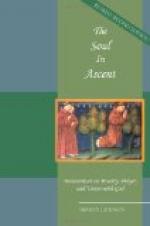The life and teaching of Jesus make the awful and insoluble mystery of suffering endurable. He satisfies no curiosity on this subject. Why suffering is permitted He does not tell us. He never allowed himself to be diverted from His one purpose, which was not to solve problems but to improve conditions. If any one approaches the New Testament expecting to find an answer to his speculative questions he will be disappointed; but if he asks, How may I so use the conditions in which I am placed that they will minister to my spiritual purification and power? he will receive a definite and satisfying reply. Why need sorrow, suffering, sin, and death invade the fair realm into which man has been born? Other teachers seek to answer this question but Jesus is silent. How may sorrow, suffering, and even moral evil be made ministers of an upward movement? On this subject Jesus speaks with a tone of authority. Among the world’s teachers He was the first to declare that while austere experiences are not good in themselves they may, uniformly, become means of moral and spiritual progress. The sweet may always be found in the bitter. Sorrow may always be made a blessing. Tears never need be wasted. Struggle always adds to strength; and sympathy is multiplied when one bears the grief and carries the burden of another.
Do not brood over what you are called to endure, but seek for the secret of spiritual help which is hidden within, and you will find that on every grief and every pain you may rise, as on stepping-stones, to higher things.
Jesus was the supreme optimist. Those who study life and history in the light which shines from Him see that no human being walks with aimless feet. They do not think of men as unrelated units, but as bound by love to one another, and as living under the eye and in the strength of God. In that light sorrow and pain may be justified, even though in themselves they are hateful. The poison which destroys life, if rightly used, will save life.
Apart from God and His purpose of love, nothing is more to be dreaded than pain; but in His hands pain becomes the servant and not the master of men.
I can think of nothing more dreary than the study of human life and history apart from the interpretations put upon them by Jesus. Then one generation seems to follow another, and the long procession, even though the character of those composing it steadily improves, always ends at the same goal,—the grave. Millions live and die like the beasts that perish. They aspire, struggle, and are determined to rise, but just when they are fitted to endure, and to enter upon ampler spheres of service, the curtain falls on the tragedy, the stage scenery is changed, a new company of players takes their places, and the farce, for it is a farce as well as a tragedy, goes on from century to century, and there is no meaning in anything. If that were the true interpretation of life, on earth’s loftiest mountain there might well be raised a temple in honor of death; and around it all the races of men be invited to join in the chorus, “Happy is the next one who dies!”




